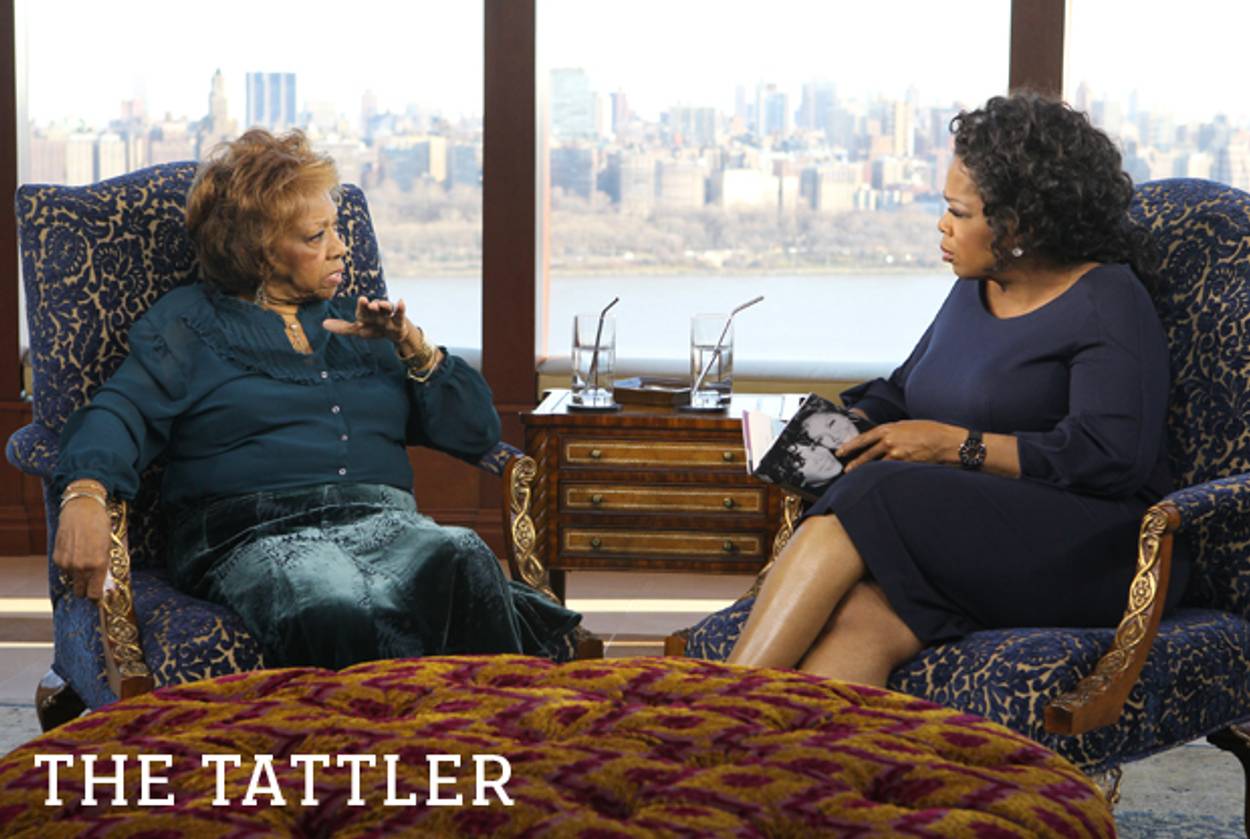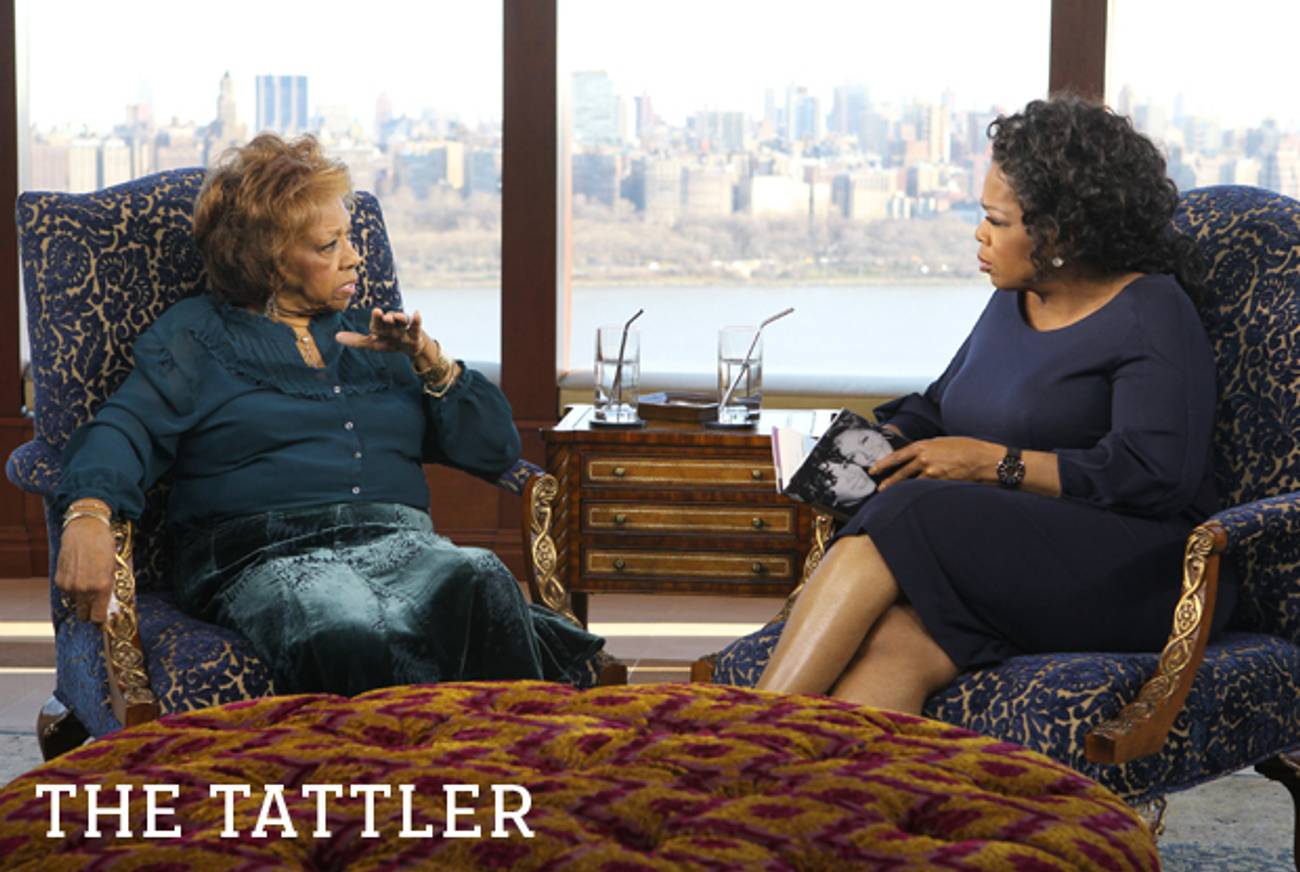Cissy Houston’s Hate—and Ours
Whitney’s mother to Oprah: Gay is not OK. Is her prejudice any different from ours against intermarriage?




If you’re not a Lubavitcher, it’s possible you might have heard of Oprah Winfrey, the Edward the Confessor of the modern age. One day, when the rising waters of New York Harbor finally swamp its barrier islands, I fully expect the rebuilt Lady Liberty gracing the desiccated shores of what once was Manhattan to be fashioned in her likeness, with the poem engraved on the pedestal on which her enormous Louboutin-shod feet rest exhorting the world to give her its housebound, its compulsive, its seekers of absolution, its celebrity hangers-on that have a book to push.
Cissy Houston—mother of the late, great Whitney—belongs to that final category, although you’d hardly know it from the hubbub over her recent sit-down with the Mother Superior herself on Oprah’s Next Chapter. Instead, most of the post-show buzz has concerned Houston mère’s candid, and seemingly unashamed, admission that, well, she’s not super comfortable with gayness.
It came out in response to Oprah’s gentle probing about the nature of the relationship between Whitney—or Nippy, as per the childhood nickname her mother uses to refer to her throughout the interview—and Robyn Crawford, her close friend and rumored lover. Cissy never liked Robyn, she tells Oprah. She was “disrespectful,” and Cissy didn’t approve of her hanging around her daughter. Cissy can’t speak to whether or not things were romantic between them; in her book, she alludes to some unnamed “experimenting” that may have occurred within the bounds of their friendship. But would it bother her if Whitney were gay, Oprah asks, with an encouraging smile.
“Absolutely,” Cissy replies.
You can practically hear the screech as she slams on the brakes. Oprah tries again, perhaps wanting to give this elderly and probably still grieving woman a chance to walk it back. The answer is the same.
“Absolutely.”
It’s a shocking moment in a time when most people have learned to at least avoid airing such noxious feelings in public; and even more so for a figure whose publishers must have given her some media training, considering what particular segment of the book-buying public might get really excited over a tell-all about Whitney Houston. (I’ll give you a hint; if Barbra Streisand had died young and her mother wrote a book about her, they’d have been excited about that too.)
And yet, I have to say, I kind of appreciate her honesty. Of all repugnant, unjustifiable prejudices, homophobia has always puzzled me the most: Why would you possibly care who someone else wants to sleep with? But something about Cissy—a woman whose beliefs remain rooted firmly in the church in which she and Whitney both began their careers—and her lack of embarrassment, her sense of rectitude about what surely she guessed would be, at the very least, an unpopular opinion, felt familiar to me. It reminded me of the attitudes many of us absorbed growing up about the possibility of intermarriage; not so much “marry a Jew or else” but “marry a Jew or we are going to be very unhappy. Marry a Jew or there will be unnamed consequences.” Seen through this lens, homophobia can be understood to be almost tribal. That’s not the sort of thing we do. Other people might be able to tolerate that sort of thing, but not us. That’s not who we are in our tribe.
You’ll forgive me for the Thomas Friedman nonsense talk for a moment, but in this interconnected world (hang on, I’m almost done) it seems like we’re subdividing ourselves more furiously than ever, taking sides over things as innocuous as bike lanes, organic vegetables, and sitcoms created by Chuck Lorre. The Republicans in Congress are against anything the president proposes, no matter if they used to be for it: If his kind of person condones something, their kind of person does not. But this contrarian tribalism—that is, defining yourself almost solely by what you stand against, regardless of reality or facts—still seems to express itself most elementally in questions of love, marriage, and sexual identity, reflecting, perhaps, a certain kind of parent’s deepest anxieties: Will the child go outside the tribe? If she does, have I failed? Have I lost her forever?
Cissy Houston really has lost her daughter, and her refusal, in the face of this, to be able to say, “You know what? I wouldn’t give a damn who Whitney maybe wanted to sleep with, if I could just have one more day with her alive” goes a long way in illustrating just how deeply ingrained these tribal prejudices can be. But in the end, that doesn’t give them validity. Nor is it fair to condemn Houston’s biases without examining our own, whatever they may be. I’m not saying it’s immoral—or even avoidable, if you find yourself so inclined—to demand that your children marry other Jews. Lack of comfort is not the same as hate, and nobody’s talking about disowning anyone or sitting shiva as if they were dead. But it’s not more moral than having a problem with them wanting to marry someone of the same sex, and all the excuses one makes as to why they have to—about religion, about tradition, about continuity—are probably exactly the same ones Cissy Houston makes to herself.
Because that’s all they are, excuses. It’s easy to be sanctimonious about Cissy Houston being pissy about the idea of her daughter being gay, but it’s not really that different, in a sort of tribalist sense, from being upset by the idea of your kid marrying someone who isn’t Jewish. Houston voiced her unequivocal disapproval, and it reminded me of the kind of unequivocal messages a lot of Jewish kids get about marrying out. And Houston is wrong, but so are all the people who demand their children choose partners on the basis of what makes their parents comfortable. A child’s happiness should never be conditional on her parents’ limitations. In both cases—Houston’s prejudice against gays and Jewish prejudice against intermarriage—parents are asking their kids to choose what makes them and their tribe happy, as opposed to what might make the child happy. And that’s not fair. Prejudice is prejudice, even if it’s yours. And the children—who as Nippy sang, are the future, after all—deserve a lot better than that.
***
Like this article? Sign up for our Daily Digest to get Tablet Magazine’s new content in your inbox each morning.
Rachel Shukert, a Tablet Magazine columnist on pop culture, is the author of the memoirs Have You No Shame? and Everything Is Going To Be Great. Starstruck, the first in a series of three novels, is new from Random House. Her Twitter feed is @rachelshukert.
Rachel Shukert is the author of the memoirs Have You No Shame? and Everything Is Going To Be Great,and the novel Starstruck. She is the creator of the Netflix show The Baby-Sitters Club, and a writer on such series as GLOW and Supergirl. Her Twitter feed is @rachelshukert.